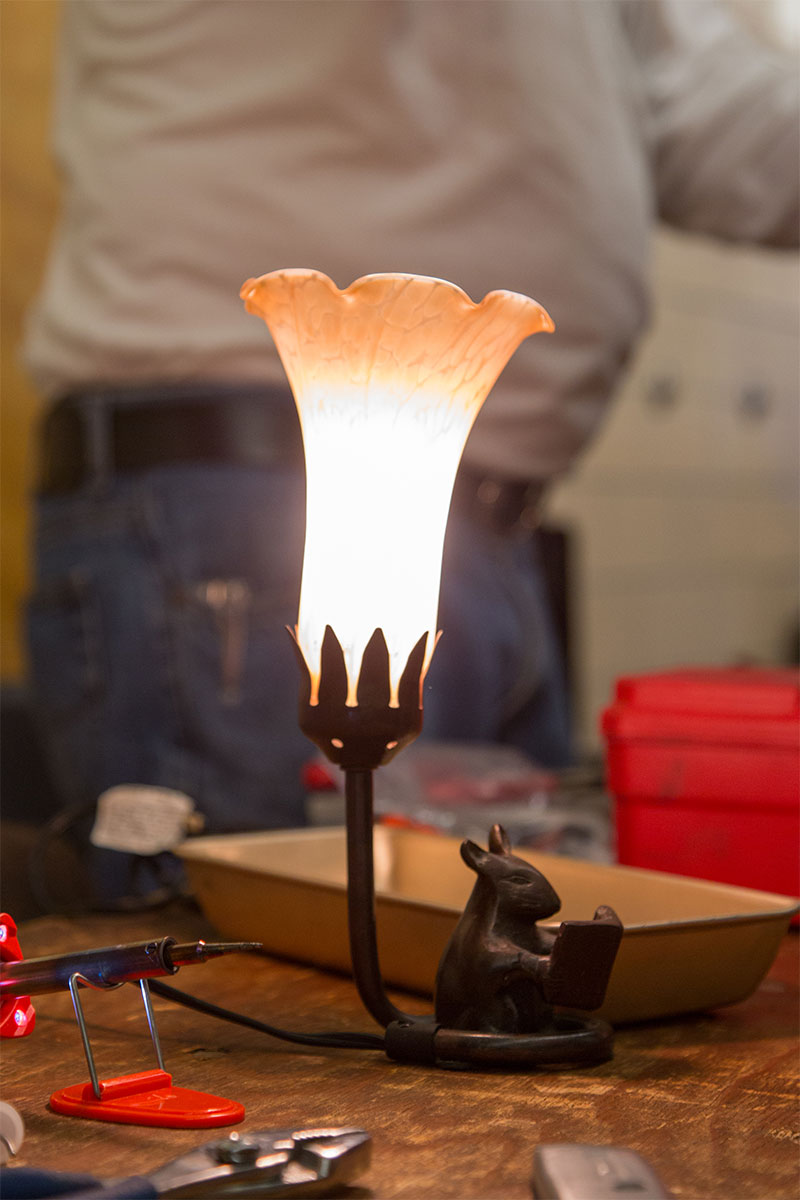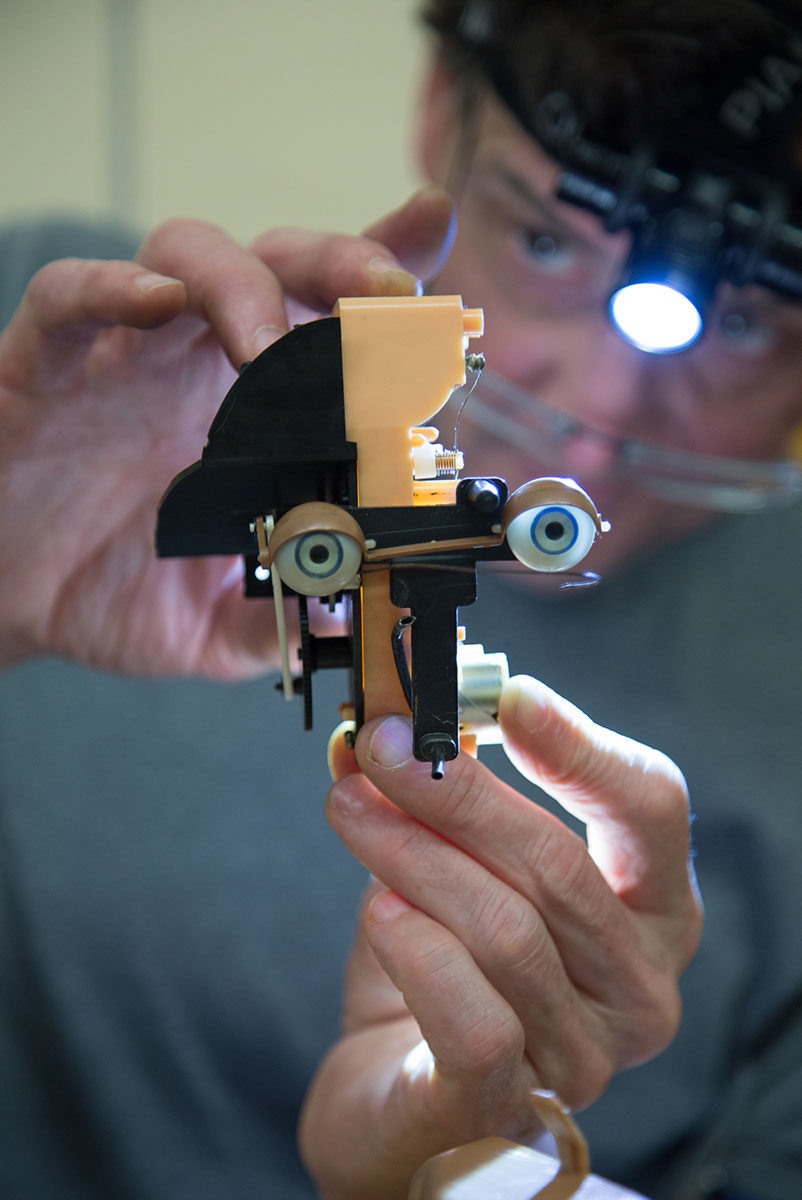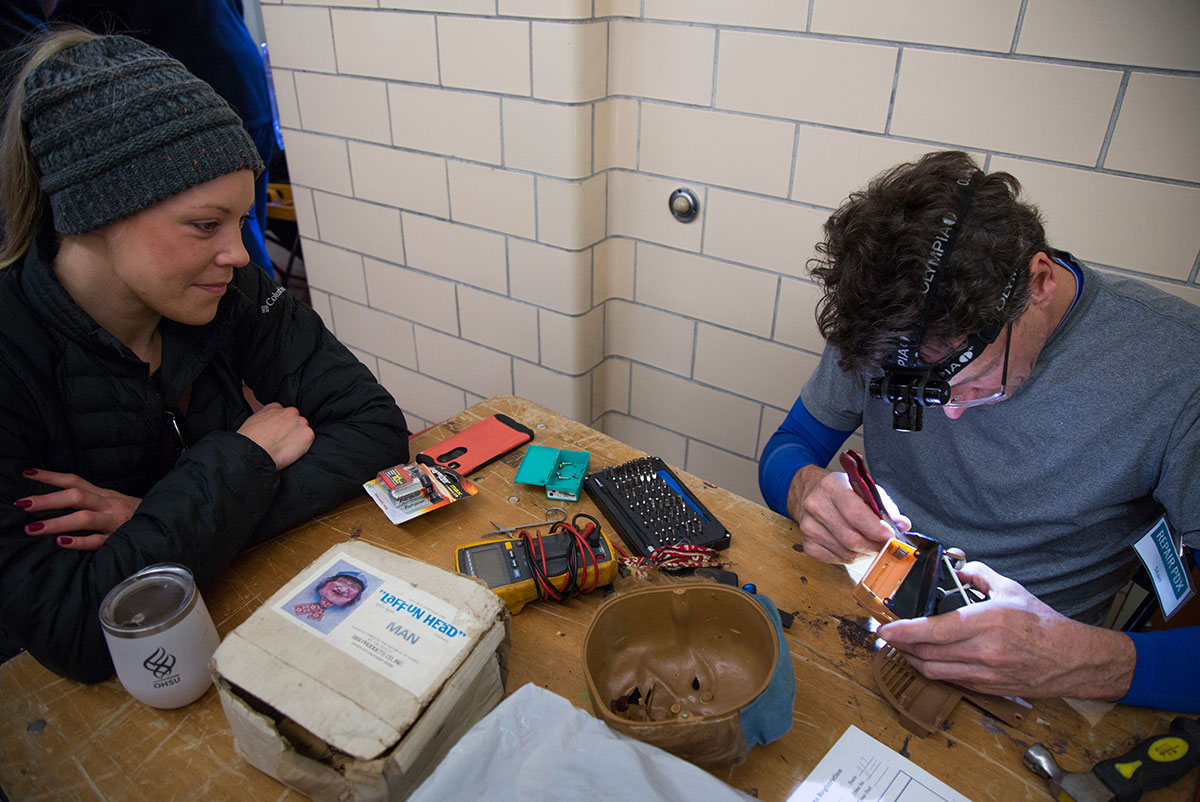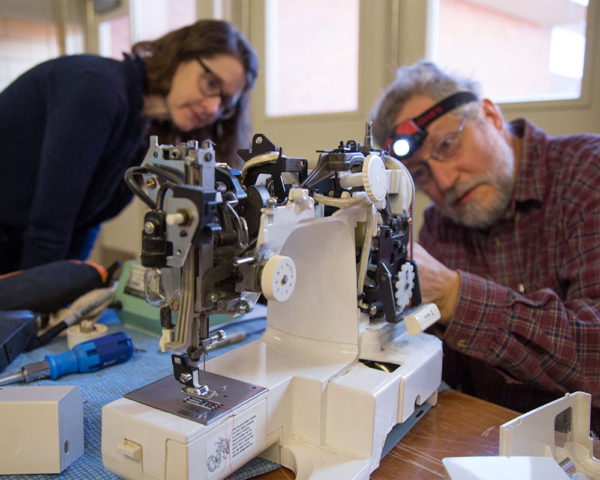Fifteen minutes after the start of last Saturday’s Repair Cafe, the waiting area was already half full of folks clutching broken items in one hand and repair slips in the other, waiting to be seen by a volunteer. The tables for repair, organized by textile and various types of electronics, were already packed with people, hopeful that their possessions could be revived. Us members of Portland Repair Finder waded through the crowd, eager to talk to everyone about why they were in attendance at the Repair Cafe.
At one table, a volunteer bent over a tiny lamp shaped as a delicate flower stem with a mouse reading at its base. The glass lampshade was the opening bell of the flower.
“It’s a gift for my daughter,” said Marsha, the lamp-bringer. Nick, the Repair Cafe volunteer, examined the frayed wire emerging from the lamp’s base.
“My daughter knows this lamp very well,” Marsha continued. “I’m the age now my mother was when she passed away, and thinking about…” She waved her hand. “You know.”
We did know. There were a lot of ideas about family and legacy, and how we carry these things forward, wrapped up in this small fact Marsha had shared. Nick carefully spliced wires, wrapped the cord in matching electrical tape, reached for the outlet. The repaired lamp threw a triumphant glow, lighting all of our faces.
A few tables down, Corina sat beside a volunteer named Stan as he squinted at a disassembled doll face. She explained that this doll had been mounted on the wall in her grandparents’ house, that it had a mechanized laugh that always creeped her out. When they passed away, she had been the one to clear out their home – and she found the doll.
“They kept so much stuff,” Corina said. “We all remember this thing.” She was going to try to fix it and give it to her brother as a gift, even though it still scared her. When Stan got the motor turning enough to elicit a ghostly laugh from the doll’s dismantled mouth, her hands flew to her ears.
There are general talking points that bubble to the surface of every Repair Cafe conversation you have. Most folks have come for one of two reasons: sentimentality or thriftiness. Some people talk about sustainability and waste streams, others about the satisfaction of working with their hands and resurrecting something broken.
At Portland Repair Finder, we share all of these opinions on the value and potential of repair. Additionally, we believe that spreading knowledge of and access to repair services increases the strength, resilience, and vitality of communities. We also share a general lament we heard from almost every Repair Cafe attendee: why should you have to throw away something that is almost totally functional? Why is buying new almost always the unchallenged default option, rather than repair?


A couple of resurrected items from a Portland Repair Cafe
Yesterday was Thanksgiving. There is no other society-wide holiday that so transparently calls on us to consider what we value, to hold the worth of the things in our lives in conscious gratitude. It’s where, in theory, we turn away from the generic cheapness of shallow existence and wade into the richer waters of fulfillment, naming what brings meaning into our days. Rarely, one would imagine, do bargain consumer goods lead the list of things we are truly thankful for.
And yet, fast on the heels of this gratitude celebration – before sunrise the next morning or, increasingly, later that same evening – people line up en masse for holiday sales or rush to buy during online sales windows. Yesterday, ostensibly, was about appreciating what we have; today is about getting more.
But parsing these two back-to-back occasions is intricate, and deserves more attention than broad-strokes moralizing. The thing is, Black Friday can have the excitement of large collective events, of gathering for a purpose. Shopping can be fun. Acquiring possessions can make us feel safe and secure.
Our relationship to the material products in our lives is complicated, and starts many twists and turns upstream from the decision to purchase a thing in a store. It’s bigger than the droplet of deciding whether to get an item fixed or put it in the trash. It’s the river of what we are socialized to view as accepted or inevitable or right.
With consumer debt at an all-time high and industrial production compromising global ecosystems, we think the moment has certainly arrived to have a deeper, considered conversation about building meaning and security for ourselves, and how that is scaffolded by the ways we choose to participate in society’s paradigms. We believe it is time to consider what of true value we receive from industrial systems, and where we might be able to fulfill those values a little closer to our own communities.
Thanksgiving itself is a part of its own problematic system, telling a cherry-picked story that ignores true dynamics of power and exploitation between colonizers and Native Americans. It is one of many cultural narratives undergoing revision and modification in the current moment. Many people have reinvented their own Thanksgiving traditions, conducting Friendsgivings or gratitude ceremonies with meaning apart from Thanksgiving’s checkered origins. In a world with greater awareness of context and consequences, we can bring nuanced perspectives to previously unchallenged narratives, and make informed choices about how we wish to move forward.
On their face, Repair Cafe events don’t wear the mantle of reinventing systems. (Also, it’s important to note that Repair Cafes are not a Portland Repair Finder event – all credit for their existence goes to Repair PDX, which does amazing work bringing repair to Portland residents. Like everyone else on Saturday, we were just lucky to be there.) Repair Cafes merely offer an important island in the current of mainstream consumption’s cultural norms, a chance to catch a breath and consider the impact of our possessions; if they will carry forward a story about where we come from, recall a ghost of laughter from the past, or if they are nothing but future garbage, waiting for the day they get dragged to the curb.
The crowded Repair Cafe waiting area underscored the significance of the event. Clearly there is a market for repair, a valued role for it to play in the lives of community members. And, if enough energy and thought were encouraged and invested in its narrative to gain real momentum, repair has the potential to grow into a societal pillar of its own.
Changing how we assign value as a society is incredibly difficult. Currently, it is more palatable for many lawmakers and citizens to accept giving over $1 billion in tax breaks to Amazon in the name of business, rather than writing off student loan debt – no matter how much data shows the economic benefits of the latter.
Our money and energy reinforce certain systems based on widespread perceptions of who should be supported in which endeavors, and how our society and economy should work. These are concepts we understand through the stories we have been told about value; what is valued, and what is not. These choices we make as a society are reinforced through the stories we tell about them.

Fixing a mechanized doll at Portland Repair Cafe
Portland Repair Finder is interested in telling a new story.
Or rather, amplifying a story that is already being told – about resilience and a grounded, meaningful way forward. Because talented and creative and motivated people are already making it happen. Here in Portland, we have people like JD’s Shoe Repair, keeping your boots trustworthy and supportive through the winter. Like Indigo Proof, resurrecting your favorite jeans through wizard-like feats of denim repair. And like every single person who carted their belongings to the Repair Cafe, thrilled at being given an option beyond the trash can.
In the coming months, we are excited to keep building out our database of important and talented repair people in our communities and the services they offer. We are excited to keep having messy and complicated and honest conversations around these topics, and do our best to move the needle on how we as a society think about consumption and repair. We are excited to expand our scope and audience while telling the story of repair in Portland. Bonus goal: we are excited help as many people get their hands to fixing as many things as we can.
Are you ready to get excited?
Words: Molly Simas
Photos: Sara Quinn
